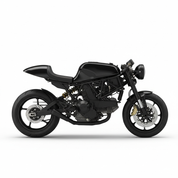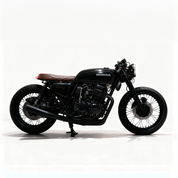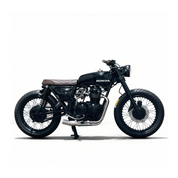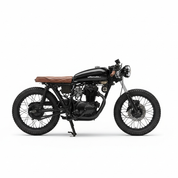 Loading... Please wait...
Loading... Please wait...BMW R-Series
BMW R-Series
The BMW R-series is a line of motorcycles produced by the German manufacturer BMW Motorrad. Known for their boxer-twin engines and distinctive design, the R-series has a rich history that spans several decades. These motorcycles are recognized for their combination of performance, comfort, and innovative engineering. Let's delve into the history of the BMW R-series:
1920s: Beginnings of the Boxer Engine
- The first BMW motorcycle, the R32, was introduced in 1923. It featured a horizontally opposed twin-cylinder "boxer" engine, a configuration that became synonymous with the R-series.
- The R32's design, with its exposed engine and shaft drive, set the foundation for BMW's future motorcycle models.
1930s-1940s: Evolution and Innovation
- Throughout the 1930s and 1940s, BMW continued to refine its boxer engine technology and motorcycle designs.
- The R5, introduced in 1936, featured streamlined styling and was known for its advanced suspension and handling characteristics.
1950s-1960s: The /2 Series and Export Success
- The /2 series, introduced in the 1950s, included models like the R50, R60, and R69. These motorcycles gained popularity internationally and were known for their reliability and performance.
- The R69S, introduced in 1960, was particularly notable for its performance-oriented upgrades and higher horsepower output.
1970s-1980s: The Airhead Era
- The /5 series, introduced in the early 1970s, marked a departure from the previous designs with more modern styling and the introduction of front disc brakes.
- The /6 and /7 series continued to build on the /5's success, introducing larger engines, improved suspension, and electronic ignition.
- The R80G/S, introduced in the early 1980s, pioneered the adventure-touring segment. It combined off-road capabilities with long-distance touring comfort.
1990s-2000s: Transition to Oil-Cooled Boxer Engines
- The introduction of oil-cooled boxer engines brought improved cooling efficiency and allowed for higher performance.
- The R1100GS, introduced in the 1990s, marked another milestone in the adventure-touring category.
- The R1150R and R1200GS, introduced in the early 2000s, showcased BMW's focus on modernizing its lineup while retaining the classic boxer-twin character.
2010s-Present: Modernization and Advancements
- The R nineT, introduced in 2014, combined retro styling with modern technology. It became a popular platform for customization and showcased BMW's heritage.
- The R1250GS, introduced in 2018, featured the ShiftCam technology, which allowed for variable valve timing and enhanced performance.
- The R18, introduced in 2020, marked BMW's reentry into the cruiser segment with a massive 1,800cc boxer engine.
Legacy and Influence: The BMW R-series motorcycles have left an indelible mark on the motorcycle industry. The distinctive boxer engine configuration, along with features like shaft drive and innovative suspension systems, have set the R-series apart. Over the years, BMW's commitment to quality, innovation, and rider comfort has established the R-series as a benchmark for touring, adventure, and classic-styled motorcycles.
The R-series continues to evolve, combining modern engineering with a nod to the brand's historical roots. It remains a testament to BMW's dedication to pushing the boundaries of motorcycle design and technology.





